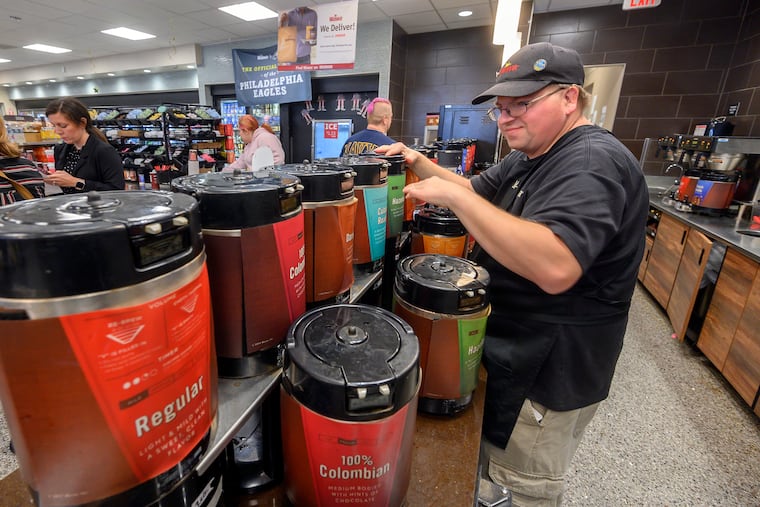Without a Wawa manager’s decision 40 years ago, 500 special-needs adults wouldn’t have jobs today
Wawa's deep commitment to workers of all abilities helps it stand out in the marketplace.

“They call me the ‘sample king,’ ” said John Mitchell as he carried a tray of Wawa smoothie samples — mini cups of frothy treats with fun names like Graveyard Smash and Spellbound Strawberry — to the front of the store on a pre-Halloween morning and began hawking them to customers.
“Graveyard Smash, Graveyard Smash! Enjoy a spectacular treat in time for Halloween!” he called out. Then, “Catch the spell of the Spellbound Strawberry! Free samples!”
Some customers hustled past without a glance. But as the lunchtime crowd thickened, Mitchell’s guileless joy — and all that whipped cream — drew others in. Customers sipped, chatted pleasantly with him, then sipped some more.
Soon, the drinks were gone, and Mitchell, looking satisfied, moved on to his next task: tending the store’s dozen coffee urns. Yes, he collects a regular paycheck for his work, he said, “but seeing the smiles of people I serve and having them say thank-you is payment enough for me.”
His boss, Ryan Schwarzman, just shook his head, grinning at Mitchell, whom he has known since 2012, when he hired him during Wawa’s annual Hoagiefest campaign.
“John is a wonderful, hardworking associate — and he brings so much fun to the job,” said Schwarzman, who manages the busy, 50-employee store on South Columbus Boulevard. “There’s never a day when he’s in the building that I don’t have a smile on my face. And customers love him.”
Mitchell, 33, who has Asperger’s syndrome — a form of autism — works two days a week staffing the coffee station, mixing specialty drinks, and lending a hand where needed. He is among many hundreds of special-needs adults who have found work through Wawa’s Supported Employment Program.
Their responsibilities are as varied as their own skills, just as they are for store employees without disabilities. Some receive assistance from job coaches provided by employment agencies (like Community Integrated Services — CIS, which worked with Wawa to place Mitchell in his job and trains him as new tasks arise). Others are able to master their duties via Wawa’s usual training processes.
But all are employed thanks to a single, progressive act of equity by a Wawa manager in 1981. The manager created a job at his Princeton store for a local man, Ari Shiner, who was a client of nearby Eden Autism Services, a nonprofit that advocates for adults with autism and their families.
“He had gotten to know Ari and wanted him to have a meaningful work experience, and things evolved from there,” said Wawa treasurer Jay Culotta. “All it took was one manager, making one decision, to start a movement that has become a very strong part of our company’s culture.”
Nearly four decades later, Shiner is still on the job, as are 500 other special-needs employees (including Culotta’s daughter, Hannah, 24, who has Down syndrome). They work alongside Wawa’s 30,000 employees throughout 860 stores in Pennsylvania, New Jersey, Delaware, Maryland, Virginia, and Florida.
They typically find Wawa via a wide network of employment-support agencies that partner closely with the company to help neurodiverse adults find success on the job.
“Our goal is to match our client’s talent with a business need; it has to make sense because this is competitive employment,” said Erin Phovilaychit, director of business development at CIS. In Mitchell’s case, “We offered coaching in the beginning but we wanted to make clear that it was John’s job, that he owned it and could eventually do it independently. We worked with the manager and team to identify ways that he could be successful.”
Mitchell had been unemployed for a year when he landed the job.
“It was like, finally, a weight was off my shoulders, because being unemployed is terrible,” said Mitchell, who lives in Bridesburg with family and was craving a workplace outlet that would tap into his outgoing personality, strong work ethic, and passion for contributing to a team.
So well has he mastered his job that Phovilaychit checks in on him just once a month. By now, the natural supports of his workplace — colleagues who look out for him, customers who know him by name — have helped him thrive. He recently started a second part-time job, at Di Bruno Bros. in the Comcast Center, volunteers with Special Olympics, where he is learning to play bocce, and is enjoying classes at Community College of Philadelphia. He’s studying behavioral health, hoping to become an educational and employment advocate for adults with developmental needs.
» READ MORE: Philadelphia companies are changing lives by hiring employees with disabilities
If having a job at Wawa has transformed Mitchell’s life, said Culotta, having Mitchell and so many neurodiverse employees in the Wawa family has transformed both the company and the communities in which the stores are located. As the father of a special-needs daughter, that touches his heart (and makes him tear up: “I always cry when I talk about this stuff,” he said).
“We get letters and emails all the time from customers saying how much they appreciate that we employ people with disabilities,” said Culotta. “When Hannah was little, people used to stare, but they don’t anymore. People are much more accepting. It feels like we’re entering an era of enlightenment."
Schwarzman, Mitchell’s boss, said he’s proud to work for a company that’s already there. Having Mitchell on staff, he said, telegraphs to the world “that people of all abilities are welcome here. I think that makes us a pretty special place.”